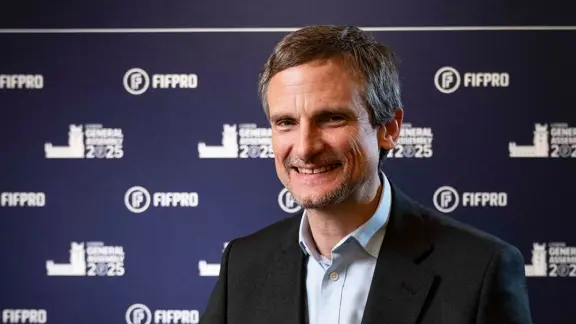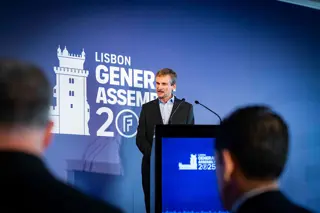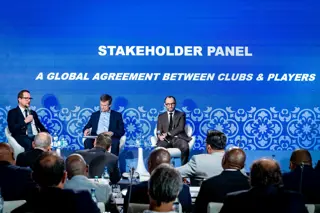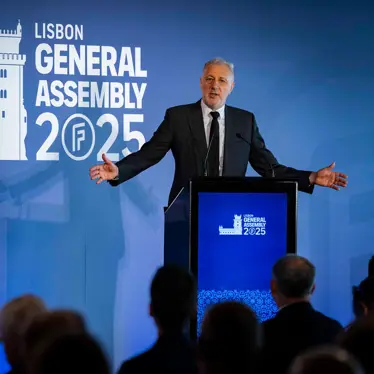Interview
Alex Phillips: "The collective voice is much more powerful than the individual"

Football’s player unions from across the world emphasised their responsibility as the true elected voice of footballers at the 2025 FIFPRO General Assembly, highlighting the growing need to address rapidly changing workplace conditions across both the men’s and women’s game.
FIFPRO member unions also highlighted a clear expectation for the broader football industry: decisions and reforms affecting players must include the voices of those authorised to represent them. FIFPRO reaffirmed its openness to constructive engagement with governing bodies and competition organisers, ensuring players remain central to all discussions and decision-making processes.
This year’s assembly held special historic weight – as FIFPRO celebrated 60 years since its founding, the gathering became both a moment to not just honour FIFPRO and player unions’ shared accomplishments, but to look collectively to the future.
FIFPRO.org sat down with Secretary General Alex Phillips to reflect on some of the General Assembly’s key themes: unity, transparency and a long-term strategy for the future.
FIFPRO: Transparency has been one of the key themes of the General Assembly, with FIFPRO opening the door for different stakeholders and players. Why is that important now?
Alex Phillips: Transparency is important for FIFPRO because we have nothing to hide. We're an open door; we're an open house. When you open, you hear criticism, you hear comments, you hear suggestions. You can't do that if the door is closed. So why not open the door?
Let people see inside. Let people see a house that's working well, is happy. Transparency is a way to be more efficient and for us to ultimately deliver more for our members and for the players.

How does this openness strengthen trust within the football industry?
Alex Phillips: Where there is no transparency people can think that things are happening, that are not actually happening. It builds trust because people can see that we are working for the players and that enables us to go to the next level. We've seen a lot of groundbreaking work with FIFPRO Europe and UEFA this year alone. That relationship continues to strengthen – and that's the type of strength we want to see across the industry. That's where real change can happen. We work with our divisions in all continents: we have a close relationship also with CONMEBOL in South America and we're working closely in the other continents to improve other relationships to deliver more for the unions and players there.
It's not always easy. But we have good relationships with most departments inside FIFA and also with confederations; those confederations recognise FIFPRO formally and in practice as the representative voice of the players in those regions.
Why is the annual FIFPRO General Assembly beneficial?
Alex Phillips: As we do every year, we bring all the members together from across the world in one place, to meet and discuss issues over three days. This time we've introduced a much greater degree of transparency, publishing our statutes and with stakeholders coming from all different types of organisations: FIFA, confederations, leagues, clubs, fans, other sports, government.
We hope to improve by having them here and listening to their observations; how they see things differently can help us to work more efficiently, and we can also understand them better. In the end, we need to work with them and make agreements together that improve the lives of the players.
You were announced as Secretary General at the 2024 General Assembly and started the role in earnest this year. How do you reflect on the organisation’s governance and leadership since you’ve been in the role?
Alex Phillips: FIFPRO has a strong governance, especially compared to other stakeholders in the football industry. One of the reasons for that is there are several mechanisms put in place to ensure FIFPRO functions efficiently. For instance, we have two boards – supervisory and management board – and a non-executive president. We also have a whole series of other measures like weighted voting and weighted financial distributions that help to ensure the organisation is much healthier than other organisations where politics can play too much of a role.
Overall, we have a strong supervisory board with capable leaders. Each of them are leaders in their own country and they bring that perspective together around the table to look at things globally. That really helps us as a management board and as a team to deliver on the strategy that we set together.

Member unions are aligned about the long-term strategy going forward. Why is that unity and solidarity important?
Alex Phillips: It's important for us to listen to the members directly. While we’re in close communication with unions throughout the year, when meeting like this at the General Assembly we can really hear firsthand and face-to-face what they think about the big strategic issues. It is a time that we can use to focus on practical issues affecting players on the ground – and get their feedback from across the world, which could be very different from continent to continent and country to country.
It's the board – both supervisory and management – who set the strategy. But without the members’ input, we can't implement it. The strategy, ultimately, reflects the needs of players and our members.
As we celebrate 60 years of FIFPRO, what lessons from the past are guiding this next chapter?
Alex Phillips: As we look forward to the next 60 years, we need to learn from the lessons of the past. The biggest one is that we need to be united, stay together, stay as strong as possible as a union does. The collective voice is much more powerful than the individual voice. That's the lesson that we can learn and apply in the next 60 years.

